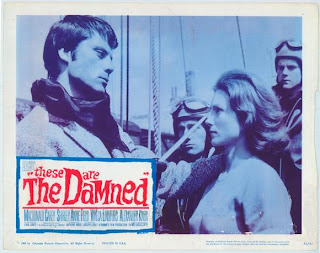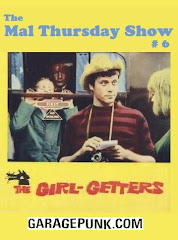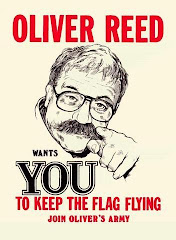The 1961 Hammer Films production of The Curse of the Werewolf, directed by Terence Fisher, marked Oliver Reed's first starring role, even if Clifford Evans got top billing. It is also one of my favorite Hammer horrors, and my favorite werewolf movie of all time.
After Hammer had put its unique stamp on Frankenstein, Dracula, and the Mummy, it was inevitable that the studio would make its own variation on The Wolf Man. When a proposed co-production about the Spanish Civil War fell through, the ever-frugal Hammer executives ordered a script to make use of the sets that had already been built. Producer Anthony Hinds adapted Guy Endore's novel The Werewolf of Paris, writing the script under the pseudonym John Elder, transplanting the action to 18th century Spain. The result is an atmospheric, grim little tale of lycanthropy, good vs. evil, and the horrors of adolescence. Or as the ads for the fim so colorfully put it, ‘He fought the hideous curse of his evil birth, but his ravished victims were proof that the cravings of his beast-blood demanded he kill… Kill… KILL!’
Unlike Universal's Wolf Man films of the '40s, The Curse of the Werewolf does not hold back on the sex and gore, especially in the version released in the US, which contained scenes the British censors had ordered excised from the film (it is this version which is included in the Hammer Horror Series DVD boxed set, available HERE). The werewolf's origin story is particularly twisted, as Leon is the bastard offspring of a feral lunatic rapist and the town jailer's deaf mute daughter, played by the Yvonne Romain. When she dies in childbirth, Leon is adopted by the kindly Don Corledo, and after an uneventful childhood, develops an unnatural bloodlust at the onset of puberty, allong with an overwhelming urge to roam the countryside disemboweling area livestock.
Trapped in a world he never made, Leon inevitably graduates to killing humans as things go horribly wrong with a local prostitute, when in the middle of a "date," Leon turns into a werewolf and rips her throat out.
Only true love, it seems, can cure Leon's full moon fever, and it arrives in the second act in the person of the lovely Catherine Feller as the virginal Christina, who loves Leon despite the occasional lycanthropic mayhem and savagery at the local bordello. But when the bodies start piling up, the local authorities are forced to take action.
 From the opening scene, the recurring theme is cruelty: the cruelty of life, the cruelty of fate, and the cruelty of the ruling class, for it is the cruelty of one particularly nasty noble that sets Leon's fate in motion. In his highly insightful essay for Cinemafantastique, Steve Biodrowski writes that The Curse of the Werewolf "plays out like a deliberate piece of Theatre of Cruelty, in which most of the sympathetic characters come to a tragic end. The result is not especially frightening, but undeniably effective, in a depressing sort of way."
From the opening scene, the recurring theme is cruelty: the cruelty of life, the cruelty of fate, and the cruelty of the ruling class, for it is the cruelty of one particularly nasty noble that sets Leon's fate in motion. In his highly insightful essay for Cinemafantastique, Steve Biodrowski writes that The Curse of the Werewolf "plays out like a deliberate piece of Theatre of Cruelty, in which most of the sympathetic characters come to a tragic end. The result is not especially frightening, but undeniably effective, in a depressing sort of way."Quite true, as Hinds's bleak view of humanity pervades the film, and subsequent Hammer horrors, such as Evil of Frankenstein, for which he provided the screenplays. Terence Fisher gives the film that iconic Hammer feel, with great color cinematography by Arthur Grant.
Oliver Reed, though raw, and a bit over the top at times, is riveting. He manages to capture Leon's torment while still projecting the charisma that would make him an international star. His performance, and the vivid production values, easily make this my favorite werewolf movie -- well ahead of The Wolf Man, even if that film came first. Lon Chaney's Lawrence Talbot is just a mopey lummox with a death wish, while Reed's Leon combines danger and vulnerability to make for a much more compelling character. Talbot is basically suicidal, while Leon wants to live. And therein lies the tragedy.
The Curse of the Werewolf makes a fine double feature with either 1958's Horror of Dracula, starring Christopher Lee, or Paranoiac, from 1963, a sub-Hitchcock psychodrama featuring another early performance from Reed.
 For further reading, check out Steve Biodrowski's essay on The Curse of the Werewolf at Cinemafantastiqueonline.com.
For further reading, check out Steve Biodrowski's essay on The Curse of the Werewolf at Cinemafantastiqueonline.com.
 THE CURSE OF THE WEREWOLF (1961):
THE CURSE OF THE WEREWOLF (1961):






